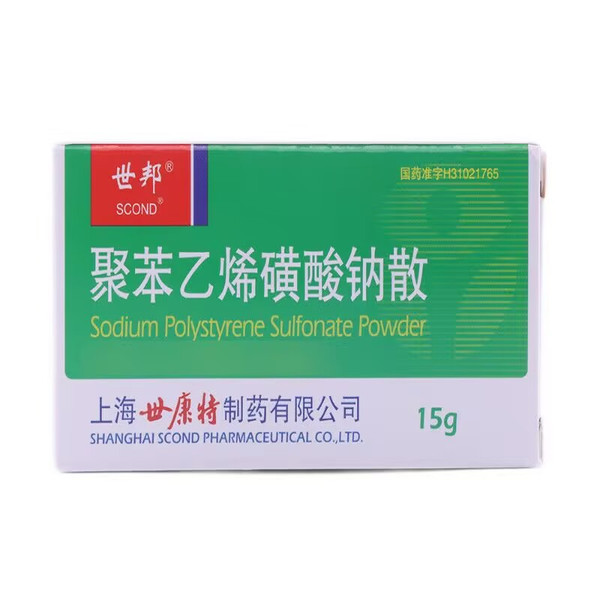Product Overview
[Drug Name]
Generic Name: Sodium Polystyrene Sulfonate Powder
Trade Name: Shibang
English Name: Sodium Polystyrene Sulfonate
Chinese Pinyin: JvhuangbenyixinaSan
[Ingredients]
The main ingredient of this product is sodium polystyrene sulfonate.
[Properties]
This product is a yellow-brown powder; odorless and tasteless. It is insoluble in water.
[Indications]
For hyperkalemia in acute and chronic renal insufficiency.
[Dosage and Administration]
1. Oral: 15-30g (1-2 bottles) at a time (can be mixed with 100ml of water), 1-2 times daily for 2-3 days. If constipation occurs, 30g of mannitol powder or sorbitol powder can be taken in combination. 2. Rectal: 30g (2 bottles) at a time, mixed with water or 100-200ml of 20% mannitol, for high retention enema, 1-2 times daily for 3-7 days. 3. Children: Use as for adults, with a daily dose of 1g per kilogram of body weight.
[Adverse Reactions]
Nausea, vomiting, stomach pain, loss of appetite, constipation, arrhythmia, muscle weakness, and stress-induced mental disturbances.
[Contraindications]
Use with caution in patients with severe hypertension, edema, and heart failure.
[Precautions]
1. Monitor fluid and electrolyte balance during treatment. 2. Discontinue use if serum potassium concentration drops to 4-5 mmol.
[Use in Special Populations]
Precautions for children: See Dosage and Administration.
Precautions for pregnancy and lactation: This study has not been conducted, and no reliable references are available.
Precautions for the elderly: This study has not been conducted, and no reliable references are available.
[Drug Interactions]
This study has not been conducted, and no reliable references are available.
[Pharmacological Actions]
This product is a pharmaceutical sodium cation exchange resin (sodium content per gram: 9.4-11.0%). After oral administration or enema, potassium ions are absorbed through ion exchange in the intestines. This lowers potassium levels by replacing sodium ions in the acidic stomach environment, forming a hydrogen-type resin. Once the hydrogen-type resin enters the intestines, it exchanges ions with potassium, ammonium, and other ions, removing excess potassium ions from the body.
[Storage]
Store in sealed containers.
[Specifications]
15g/bottle x 1 bottle/box
[Packaging]
Plastic bottles sealed with aluminum foil. 15g x 1 vial.
[Expiration Date]
36 months
[Approval Number]
National Standard Drug Code H31021765







